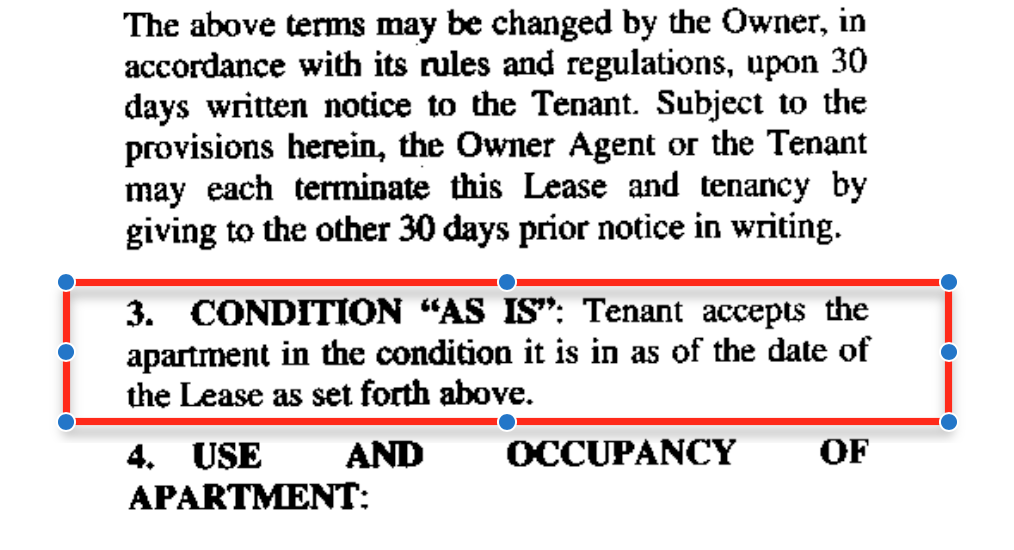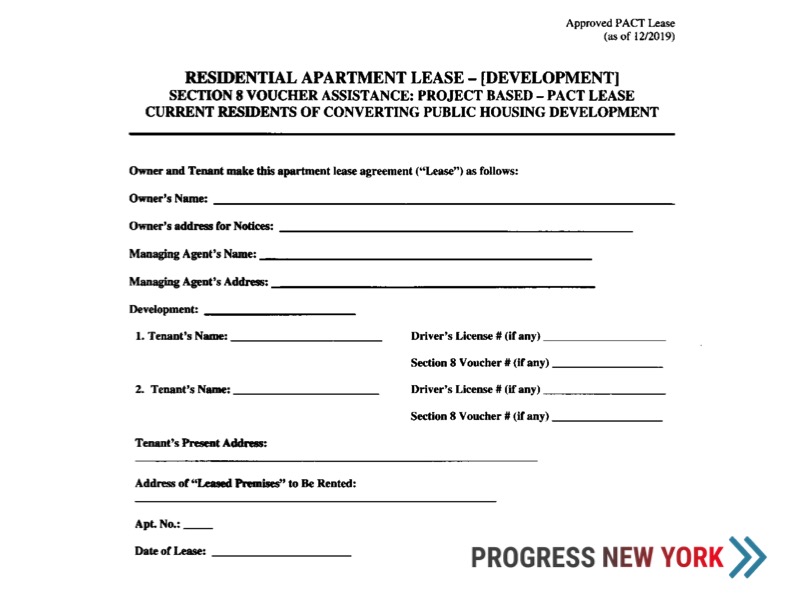NYCHA releases the form of its RAD Lease, an agreement that appears to preclude residents from suing RAD Landlords and NYCHA over repairs and injuries.
By PROGRESS NEW YORK STAFF
Documents obtained by members of the activist group Fight For NYCHA reveal legal restrictions and supportive service cuts that public housing residents face in New York City following the “partial privatisation” of the New York City Housing Authority, or NYCHA.
Public housing residents of 572 Warren Street will be strong-armed into accepting the conditions of their apartments “as is” under an impending conversion from Section 9 public housing to project-based Section 8 housing of their apartment house. The “as is” language appears in the form of the RAD Lease Agreement posted online by the activist group.

According a blog post published by Fight For NYCHA, “Landlords argue that when tenants accepted apartments ‘as is,’ tenants accept dangerous conditions on the property and are thus precluded from suing landlords over dangerous conditions,” noting that critics of such restrictive contract language characterise such language as an example of an “unenforceable disclaimer of the warranty.” Anti-privatisation activists claim that the “as is” RAD Lease Agreement language may be an attempt by the de Blasio administration to limit the City’s liability for NYCHA’s physical condition standards scandal. Furthermore, Fight For NYCHA provided additional information about some of the restricted wording in the RAD Lease Agreement, revealing that, “a representative of the new RAD Landlord for 572 Warren Street admitted that NYCHA worked in conjunction with the Legal Aid Society to draft the Form of the RAD Lease, adding that some of the language was requested or required by the RAD bankers acting as lenders” to the RAD conversion.
Residents at 572 Warren Street and at other NYCHA public housing developments in Brooklyn face imminent RAD conversion and are expected to be managed by a consortium of private landlords and developers that includes donors to the political committees of Mayor Bill de Blasio (WFP-New York City), according to a report published by 6sqft. The consortium includes Arker Companies, Omni Development, Dabar Development Partners, and Bedford Stuyvesant Restoration Corp., according to a report published by The Real Deal. In 2018, Arker and another developer, Two Trees Management, were selected by the City of New York to construct two towers at the Wyckoff Gardens public housing complex in Brooklyn ; individuals associated with the two builders reportedly “raised a total of $124,600” for Mayor de Blasio’s various political committees, according to the 6sqft report. Mayor de Blasio was once the subject of a wide-ranging, Federal corruption investigation into his fundraising practises that was closed in 2017 without any charges being filed against him, according to a report published at that time then by the New York Times.
RAD stands for Rental Assistance Demonstration, an Orwellian name given to an Obama administration housing program that turns public housing into a “public-private partnerships.” RAD has been shown to lead to higher rents, an increased incidence of landlord harassment, and upward spikes in evictions.
Other troubling information, contained in the RAD Handbook, shows that there is a risk that the RAD Landlord may not make all of the capital repairs to standards due to the RAD Landlord’s profit motive and desire to protect their investment. Another section of the RAD Handbook shows that there is a risk that residents of Section 8 RAD conversion apartment buildings will lose supportive services, like NYCHA job placement services.
NYCHA faces “partial privatisation” under a plan by Mayor de Blasio to put at least one-third of NYCHA’s public housing apartments into the hands of private landlords under RAD as a way to raise some revenue to pay for long, overdue capital repairs. NYCHA’s capital budget faces a shortfall estimated to be $32 billion, and growing. RAD permits private sector landlords to fund some repairs at public housing as property managers in exchange for tax credits and rent.
Source Documents
- RAD Handbook [Archive.org]
- Form of RAD Lease [Archive.org]
- Frequently Asked Questions about RAD [Archive.org]
- Q’s and A’s [Archive.org]

